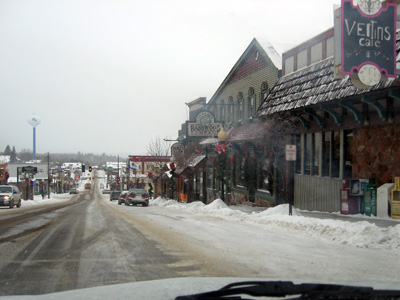
There’s been a two-pronged approach today on Minnesota Public Radio to an old Minnesota problem: Keeping rural Minnesota vital in an era when young people, in particular, tend to move away. I’m not sure we’ve found answers.
First, MPR’s Midmorning has been talking to Patrick Carr, an associate professor of sociology at Rutgers University and co-author of “Hollowing Out the Middle: The Rural Brain Drain and What it Means for America.”
One of the most interesting things he said this morning — and I’m paraphrasing — is that schools make a mistake by identifying the best and the brightest, lavishing educational resources on them, pushing them off to college, the stepping stone to a life lived somewhere else.
He noted that in “the old days” the people who stayed behind could find a decent job and a live a good life, but those opportunities aren’t in such abundance anymore.
What’s a state to do? Gov. Pawlenty tried his JOBZ program to encourage businesses to locate in rural Minnesota, and that hasn’t really worked that well. In many communities, the major employer is the school system and some would say the state isn’t exactly friendly to that business these days. “I’m an achiever who moved away. I just can’t move my kids back to the small town when the schools are underfunded and the older citizens continually ignore the schools in their rigid rejection of taxes,” reader Chad wrote.
Meanwhile, Public Insight Network boss Michael Caputo has been hosting an online discussion with some experts around the state. Ben Winchester of the University of Minnesota Extension Center for Community Vitality, for example, disputed the notion of a brain drain, saying the age 30-49 migration to rural Minnesota is at record levels.
An online reader added:
I’m a 38-year-old who recently returned to my small town with my husband and kids after 20 years living in and nearer the Twin Cities. I wanted to come back years ago, but jobs are a big issue. My husband commutes to the Cities; we live about an hour west of Mpls. One thing that has helped him is DSL recently coming to our neighborhood, allowing him to work at home 2 days a week. Before that we had no good high-speed access.
A caller, who moved up from Chicago, said she moved back to rural Minnesota and she attempted publish a calendar of cultural happenings in outstate Minnesota, and now questions whether anyone cares.
Another reader wrote:
I’m 28, I used to live in an urban area and have moved to a smaller town 6 months ago. I was really worried about finding a job, especially in this recession, but because we have good broadband here, I was able to get a job from a company based in NYC.
What can one conclude from all of this? Here are some possibilities:
1) You can move to rural Minnesota if you make your living in some consulting field and can find a company to hire you without having you sit in a cubicle somewhere. But how many opportunities — really — are there for people like that? Still, listener Russell of Lake City proves it can be done. “My wife and I are in our mid twenties and just moved back to our hometown this summer immediately after completing our masters degrees. Our first child is due anyway now and we wanted to raise our kid in a small town and near family. I work for a large bank and was able to get a job that allowed me to work from home. My wife works in health care so she had plenty of options near Lake City. Being able to work from home really allowed this to happen,” he said.
2) You can move to rural Minnesota if you make your money in the big city, and can afford to retire or otherwise “live down” economically. But how many people can do that?
3) You can move to rural Minnesota if you don’t mind a long commute to your job in the Twin Cities.
4) You can move to Minnesota if you’re self employed or have skills in fields that are in demand in rural Minnesota. What are those?
5) You can move to rural Minnesota if you’re in the education or health care field.
Unquestionably, rural Minnesota is a great place. Small towns offer a quality of life that can’t be found in cities.
But how can one make a living there? That’s the question that seems to be the key to today’s discussions. It also seems to be the one that hasn’t yet been answered.
